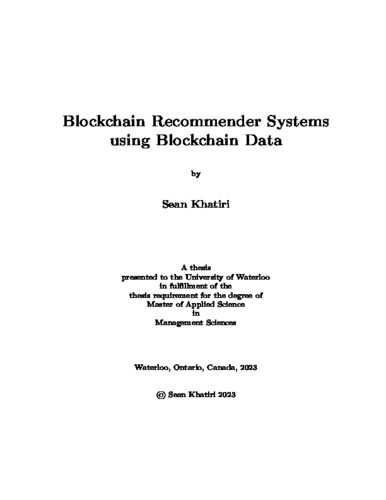| dc.description.abstract | Blockchain systems allow a network of pseudo-anonymous users (identified only by their public key) to maintain a secure transaction ledger in a decentralized manner. Transactions are executed and recorded on the ledger by programs called smart contracts. Decentralized applications (dApps) can be built on top of blockchains, for tasks such as exchanging cryptocurrencies and other digital assets, without the need for trusted third parties such as banks. As is the case with traditional Web applications, personalization is key to user acquisition and retention in decentralized systems. We therefore ask the following question in this thesis: how can we build effective blockchain recommender systems?
To answer this question, we turn to collaborative filtering, a popular recommendation approach that captures similarities among users in terms of their transaction histories. For example, if two users liked movies a, b, c, and d, and the first user additionally liked movie e, then collaborative filtering may suggest movie e to the second user. The main technical challenge we address is how to map smart contract code to the underlying items or concepts that may be recommended, e.g., a smart contract that facilitates an in-game purchase using Bitcoin may map to the “gaming” concept. Using this mapping and real-world data from
the Ethereum network, which is the largest smart-contract-enabled platform, we test two collaborative filtering systems: a simple and fast Matrix Factorization (MF) algorithm and a more complex one based on Graph Neural Networks (GNN). Our empirical results show that GNN outputs more effective recommendations, at the expense of latency. We conclude with an overview of a blockchain-native implementation of our framework as a decentralized recommendation service, and we discuss the corresponding practical challenges such as incentive mechanisms (tokenomics). | en |

